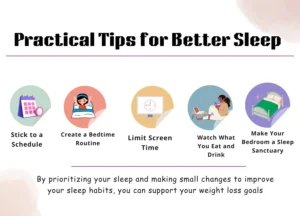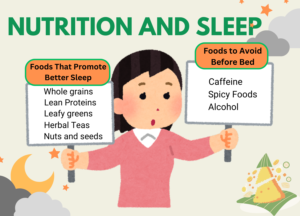How Much Sleep Do I Need To Lose Weight

Sleep is essential for overall health and can significantly impact your weight loss journey. If you’ve ever wondered, “How much sleep do I need to lose weight?” you’re at the right place. Getting the right rest is just as important as eating well and exercising.
In this article, we’ll explore the fascinating connection between sleep and weight loss, figure out how much sleep you need, and offer practical tips to help you improve your sleep habits and achieve your weight loss goals.
Sleep’s Impact on Weight Loss
When you’re sleep-deprived, your body produces more ghrelin, the hunger hormone. This makes you hungrier and more likely to reach for sugary, high-calorie foods.
At the same time, lack of sleep lowers leptin levels, the hormone that signals fullness. Without enough leptin, your body doesn’t realize it’s full, making it easy to overeat.
High ghrelin and low leptin create a fever-like craving, especially for junk food. When there is a hormone imbalance, it is difficult to resist late-night snacking and a balanced diet.
- Lack of sleep affects the part of your brain controlling rewards, making you more likely to seek comfort foods when tired and stressed.
- Poor sleep disrupts metabolic processes, making it harder for your body to burn calories efficiently causing weight gain.
- It increases insulin resistance, which can cause trouble regulating blood sugar levels and lead to more fat storage, especially around the belly.
- Tiredness reduces your activity levels, resulting in fewer calories burned daily and hindering weight loss efforts.
- Sleep is crucial for muscle recovery after exercise. Without adequate rest, muscles don’t recover properly, reducing workout performance and slowing down weight loss progress.
How Much Sleep Do I Need To Lose Weight
General Recommendations
So, how many hours of sleep do you need to support your weight loss efforts? The answer can vary from person to person, but generally, adults should aim for 7-9 hours of sleep each night. However, specific needs might differ based on age, lifestyle, and overall health.
Finding Your Optimal Sleep Duration
Recent studies have highlighted the importance of finding the right amount of sleep for your body. For example, research published in the American Journal of Clinical Nutrition found that women who slept less than 6 hours or more than 8 hours per night gained weight over time than those who slept 7-8 hours. This suggests that there is a sweet spot for sleep duration that can help with weight management.
- Listen to your body and determine how much sleep makes you feel best.
- Pay attention to how you feel after different amounts of sleep, and aim to get that optimal amount consistently.
- Prioritizing quality sleep each night can significantly affect your weight loss journey and overall health.
Common Sleep Myths and Facts
Numerous misconceptions about sleep can mislead people and hinder their efforts to improve their sleep quality. Here are some common myths and the facts that debunk them:
Myth 1: You Can Catch Up on Sleep During Weekends
Fact: While sleeping in on weekends might make you feel better temporarily, it doesn’t fully counteract the negative effects of sleep deprivation accumulated during the week. Maintaining a consistent sleep schedule is crucial for long-term health.
Myth 2: The More Sleep, the Better
Fact: Both too little and too much sleep can have adverse health effects. Consistently sleeping more than 9 hours a night can be linked to health problems like diabetes, heart disease, and increased mortality.
Myth 3: Snoring is Harmless
Fact: Occasional snoring can be normal, but frequent loud snoring might indicate sleep apnea, a serious sleep disorder that requires medical attention.
Myth 4: Watching TV Helps You Fall Asleep
Fact: The blue light emitted by TVs and other screens can interfere with your body’s production of melatonin, the sleep hormone, making it harder to fall asleep.
Myth 5: Drinking Alcohol Before Bed Improves Sleep
Fact: While alcohol might help you fall asleep faster, it can disrupt your sleep cycle, leading to poorer sleep quality and frequent awakenings during the night.
Practical Tips for Better Sleep

Stick to a Schedule
- Improving your sleep hygiene can boost your weight loss journey.
- Make an effort to wake up and go to bed at the same hour every day.
- This facilitates natural sleep and wakefulness by balancing your body’s internal clock.
Create a Relaxing Bedtime Routine
- Create a relaxing nighttime ritual to let your body know when to relax.
- Activities like reading, taking a warm bath, or practicing relaxation techniques such as deep breathing or meditation can help you relax and prepare for sleep.
Limit Screen Time
- Switch off electronics an hour or more before going to bed.
- The blue light emitted by phones, tablets, and computers can interfere with your body’s natural sleep-wake cycle, making it harder to fall asleep.
Watch What You Eat and Drink
- If you need a snack before going to bed, choose something lighter.
- Avoid heavy meals, caffeine, and alcohol in the evening, as they can disrupt your sleep.
- Opt for lighter snacks if you need something before bed.
Make Your Bedroom a Sleep Sanctuary
- Create an optimal sleep environment in your bedroom.
- Keep it cool, dark, and quiet. Invest in a comfortable mattress and pillows to ensure a cozy rest place.
- Making your bedroom a sleep sanctuary can help you get the quality rest you need.
The Role of Sleep Posture
Believe it or not, your sleeping position can influence your weight loss journey. While there isn’t a one-size-fits-all answer, certain sleep postures are generally recommended for better spinal alignment and overall comfort.
Sleeping on your back or side is often considered the best for most people.
- Sleeping on your back or side helps keep your spine neutral, reducing strain on your back and neck.
- Sleeping on your back can help prevent acid reflux symptoms compared to sleeping on your stomach.
- Side sleeping can also help open your airways, making breathing easier, especially if you suffer from sleep apnea or snoring.
However, sleeping on your side may be more beneficial if you have sleep apnea or snoring issues. This position can help keep your airways open and reduce snoring. Ultimately, the best sleep posture allows you to rest comfortably and wake up feeling refreshed.
Nutrition and Sleep: A Symbiotic Relationship
The food you eat significantly impacts your sleep quality, and good sleep can influence your dietary choices, creating a beneficial cycle.

Here’s how nutrition and sleep work together:
Foods That Promote Better Sleep
- Complex Carbohydrates: Foods like whole grains, fruits, and vegetables can boost serotonin production, promoting better sleep.
- Lean Proteins: Foods like chicken, turkey, and fish contain tryptophan (an amino acid) that helps produce melatonin and serotonin.
- Magnesium-rich foods: Leafy greens, nuts, seeds, and bananas are rich in magnesium, which can help relax muscles and improve sleep quality.
- Herbal Teas: Chamomile, valerian root, and lavender teas have calming properties that can help you relax before bed.
Foods and Beverages to Avoid Before Bed
- Caffeine: A stimulant found in coffee, tea, chocolate, and some medications, caffeine can keep you awake.
- Heavy or Spicy Foods: These can cause indigestion or discomfort, making it difficult to fall asleep.
- Alcohol: While it might make you sleepy initially, alcohol can disrupt your sleep cycle.
The Role of Hydration
- Staying hydrated is important, but drinking too much before bed can lead to frequent bathroom trips, disrupting sleep.
Addressing Sleep Disorders and Health Risks
Both inadequate and excessive sleep can negatively affect weight loss and overall health. Adequate sleep is crucial, but it’s also important to avoid oversleeping.
- Finding the right balance is key to supporting your weight loss goals and maintaining optimal health.
- If you’re consistently getting too little or too much sleep, it may be worth discussing with a healthcare provider to identify any underlying issues and make necessary adjustments.
- If you’re struggling with sleep issues such as insomnia or sleep apnea, it’s crucial to seek help from a healthcare professional.
- Treatment options may include lifestyle changes, therapy, or medication, depending on the underlying cause.
- If you’re having trouble getting the quality sleep you need, don’t hesitate to ask for help from sleep specialists.
Sleep Tracking and Technology
Modern technology offers various tools to help you monitor and improve your sleep patterns. Here are some popular options:
Sleep Trackers and Apps
- Gadgets like Fitbit, Apple Watch, and Oura Ring track your sleep stages, duration, and quality. They provide insights and recommendations based on your sleep data.
- Apps like Sleep Cycle, Pillow, and Calm monitor your sleep using your phone’s sensors. They can wake you up during the lightest sleep phase, making you feel refreshed.
- Products like Sleep Number and Eight Sleep track your sleep patterns and adjust their firmness or temperature to optimize your comfort.
- Be aware of data privacy and choose reputable companies that protect your personal information.
Benefits of Sleep Tracking
- Understand your sleep patterns and identify factors that impact your sleep quality.
- Receive recommendations for improving your sleep environment and habits.
- Tracking progress can motivate you to stick to healthy sleep practices.
Conclusion
Getting enough quality sleep is essential for weight loss and overall health. By prioritizing your sleep and making small changes to improve your sleep habits, you can support your weight loss goals and feel better mentally and physically.
Remember, sleep is not just a luxury—it’s a necessity. So tonight, why not start by creating a relaxing bedtime routine and giving your body the rest it deserves?
FAQs
Why is sleep important for weight loss?
Quality sleep regulates hunger hormones, metabolism, and insulin levels, all essential for weight management.
How many hours of sleep do I need to lose weight?
The general recommendation for adults is 7-9 hours per night, but individual needs may vary.
Can poor sleep affect my metabolism?
Yes, inadequate sleep can disrupt metabolic processes, leading to weight gain and an increased risk of obesity.
What should I do if I have trouble sleeping?
If you’re struggling with sleep issues like insomnia or sleep apnea, it’s essential to seek help from a healthcare professional. Medication, therapy, and lifestyle modifications are possible forms of treatment.
Is it possible to oversleep and hinder weight loss?
Yes, inadequate and excessive sleep can negatively affect weight loss and overall health. Finding the right balance is key to supporting your weight loss goals.






